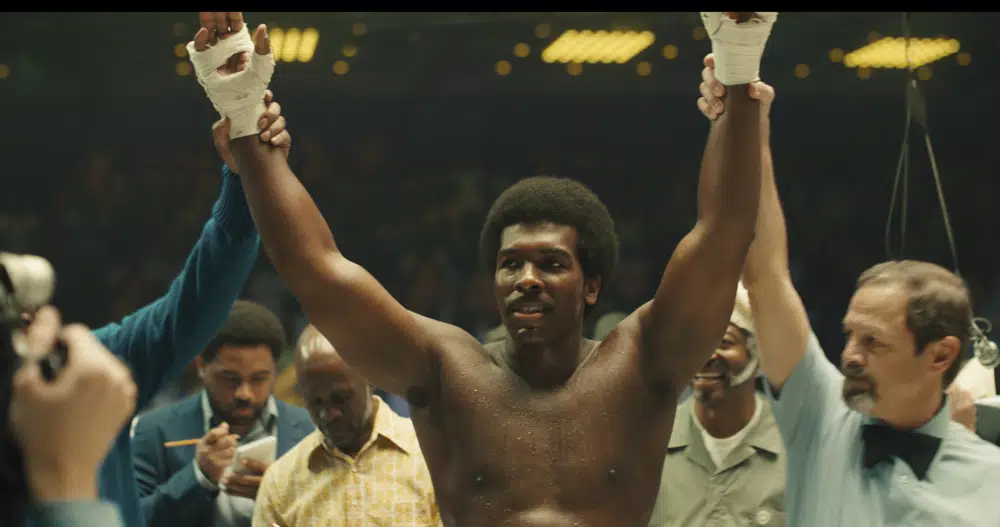We bring news that matters to your inbox, to help you stay informed and entertained.
Terms of Use and Privacy Policy Agreement
WELCOME TO THE FAMILY! Please check your email for confirmation from us.
Davis put on 50 pounds in five weeks to play character
Khris Davis did not know who he was auditioning for when he first got the lines for an untitled project about a boxer. They didn’t even tell him it was based on a true story at first. But he liked that there was a character arc — it’s more than actors often get early in auditions.
Somewhere along the way he began to piece it together. And then it clicked: Oh, this is George Foreman, he thought.
The film, “Big George Foreman,” is now playing in theaters nationwide. It charts his path from impoverished youth to heavyweight champion, his crushing loss to Ali in Zaire that led him to give up boxing, all the way through his miraculous comeback to the sport at age 45.
“A lot of people see George as the grill guy,” director George Tillman Jr. said. “Some people see him as the boxer. I wanted to tell a story of things that you don’t know.”
Tillman Jr. (“The Hate U Give”) had been searching for a while for the right actor. Some had the acting chops but not the size. Some had the size but not the chops. And they had the added pressure that Foreman himself was executive producing. Then 6-foot-4-inch Davis emerged. It would take a chemistry test with Sullivan Jones, who plays Muhammad Ali, to seal the deal.
Davis cut his teeth in the theater world, in Philadelphia first before he made the jump to New York. Oddly enough, his big break came in 2016 with a play also about a boxer, as the lead in Marco Ramirez’s “The Royale” at Lincoln Center Theatre. It was loosely based on the life of heavyweight Jack Johnson. Davis’ Broadway debut came in 2017 with “Sweat.” Movies started coming, too, with roles in Kathryn Bigelow’s “Detroit” and “Judas and the Black Messiah.”
He’d never had a challenge quite like George Foreman, but he was used to giving it all in the theater and he was going to do that here, too.
“It didn’t occur to me to put on a fat suit,” Davis said. “Why would I put on a fat suit if I can gain the weight? It didn’t occur to me to put a bald cap on. Why would I do that? I’m going to cut my hair off. It never occurred to me to cut a corner.”
Still, Tillman Jr. was a little nervous when he sent Davis off for a five-week hiatus in which he was supposed to put on a significant amount of weight. He didn’t tell his star, but he had a backup plan of a fat suit waiting. He also knew it was an imperfect solution: How would it look when the shirts came off in the ring?
But he didn’t need to worry. When Davis came back, Tillman was shocked to see that he’d actually gained 50 pounds in five weeks, going from 225 pounds to a heavyweight 275.
“I didn’t know my body could do that,” Davis said. “And sometimes I look at the images and I’m still in shock because I can’t believe that I managed to do that to myself. I was eating 7,000 calories a day. The heaviest I got was 282.”
It was, he said, hard on him emotionally to look in the mirror and see “Khris” going through this. That’s when he cut his hair, shaved his beard, took his shirt off, looked in the mirror and saw “George” instead.
“I said, ‘There you are. There it is,’” Davis said. “Every calorie that I was eating was worth it because it was working and I could see it being built all around me. It was insane. It was intense. But I think that amount of effort was worth it.”
The boxing was another challenge, full of complex choreography and a number system for where the hits were going to go. And they got to a certain point where they were comfortable enough to make “real contact” with the hits. During the staged Ali fight in Zaire, he believes he was punched in the face about 45 times. Davis got his hits in too, though.
“Those weren’t easy, soft punches,” Davis said. “If they would have cut the audio down and just let you hear my gloves hitting his body, it was shocking.”
And top of mind was always the real person he was playing.
“He was always kind of overlooked and bypassed. Mr. Foreman should not have been an underdog as much as he was in his life,” Davis said.
“People talked about his rage. And as I was looking at interviews and looking at him on talk shows and on TV shows, I kept seeing this guy smiling and I’m like, ‘Wait a minute. Hold on, hold on. You guys are saying this is a crazy, deranged, mean guy, but this guy is smiling so much, he’s laughing, belly laughing out loud.’
“I was like, ‘There’s a gentle person in there with a big heart. I can see it.’ So I wanted to carry that not just in the second half.”
Davis continued: “People think that he learned how to do that when he came back. No, that’s who he always was. But in the second half of his life, he didn’t have to commit to the persona anymore… This is his story. It’s not my story. Sure, part of my legacy is married to his story because I’m telling his story, but it’s his. It’s really a continuation of his legacy. I just didn’t want to disappoint him.”
TheGrio is FREE on your TV via Apple TV, Amazon Fire, Roku and Android TV. Also, please download theGrio mobile apps today!

